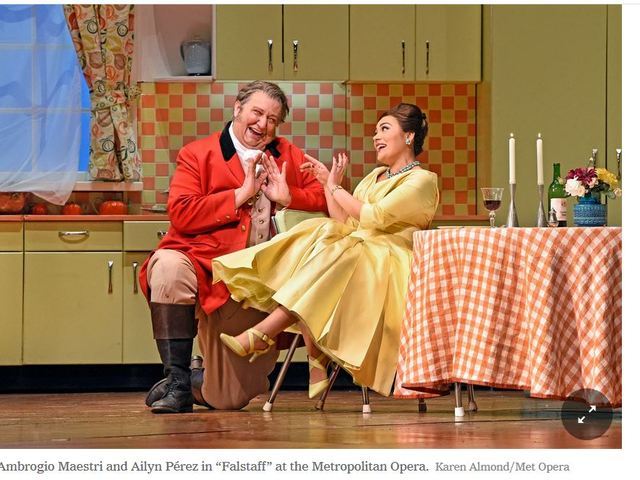
I agree with Tony that this update worked-the problem is that for me the vast majority don't. Regards, Len
Ambrogio Maestri Returns for Another Round as ‘Falstaff’
By Anthony Tommasini
Feb. 24, 2019
To opera devotees who on principle believe that productions of a cornerstone work should be true to the original setting, I say get thee to Verdi’s “Falstaff” at the Metropolitan Opera. Robert Carsen’s 2013 production, which returned on Friday, is an exhilarating demonstration of how an insightful updating can reveal a great opera anew.
From the vibrant performances of this winning cast, headed by the powerhouse baritone Ambrogio Maestri, who owns the title role, it seemed clear that the singers relished the chance this production provides to bring fresh immediacy to Verdi’s characters.
Mr. Carsen sees Verdi’s bustling comic opera as overcast with melancholy. The entitled aristocracy is losing sway as new class structures allow self-made men to emerge. To bring out those resonances he shifts the Elizabethean setting to 1950s England, when an entrepreneurial population was emerging.
The first scene, set in Falstaff’s room at the Garter Inn, shows the lumpy Sir John loitering in bed in a commodious oak-paneled room in a fading hotel. Room-service carts cluttered with dirty dishes are scattered everywhere. The whiny Dr. Caius (Tony Stevenson) accuses Falstaff of causing drunken chaos at his house the previous night. Falstaff’s slovenly henchmen (sung by Keith Jameson and Richard Bernstein) bicker with their boss.
But when Mr. Maestri’s gigantic Falstaff finally stands up, he’s a scraggly, pathetic sight in his grimy long johns. Yes, Falstaff is a debt-ridden, self-deluded mooch. But when Mr. Maestri, in chilling voice, delivers Falstaff’s defense of his girth as an embodiment of stature and potency, you feel sympathy for this laughingstock of a knight.
The second scene, in the garden of Alice Ford’s house, is shifted to a charming restaurant in Windsor where the merry wives, wearing colorful, slightly ostentatious dresses, are having a lunch date. The singers look charming and sing wonderfully: the soprano Ailyn Pérez, in plush voice as Alice; the rich-toned mezzo-soprano Jennifer Johnson Cano, a knowing Meg Page; the impressive contralto Marie-Nicole Lemieux, a plucky Mistress Quickly; and the exquisite soprano Golda Schultz, endearing as Nannetta, Alice’s daughter, who pines for young Fenton. Who is Fenton in this concept? A smitten waiter at the restaurant, here the ardent tenor Francesco Demuro. It’s perfect.
My favorite scene comes at the end of Act II, when Falstaff arrives at Alice Ford’s house for what he thinks will be a secret rendezvous with her. (It’s a scam the women have concocted to teach him a lesson.) Mr. Carsen places it in a spacious Betty Crocker kitchen with bright yellow cabinets and gleaming appliances. Ms. Schultz’s Nannetta, wearing pedal-pushers and an oversized shirt, comes storming in, grabs a big bowl of Jell-O from the refrigerator, sits at the kitchen table and digs in glumly. What’s the matter? Practically crying, she says that her father (an ambitious businessman type, the robust baritone Juan Jesús Rodríguez) is going to make her marry Dr. Caius! The women just laugh: Caius? That fossil, that fool? They won’t let it happen. This staging touch brings out the feminist subtext of the opera: that for all the patriarchal bonds of society, women are ascendant and emboldening each other.
The noted British conductor Richard Farnes, who was music director of Opera North in England for 12 years, led this “Falstaff” in his Met debut, with mixed results. Stretches of Verdi’s miraculous score had élan, color and clarity. But there were glitches and moments of poor ensemble. The performance may settle in. And opera lovers, especially those wary of updating, should not miss this inspired production of Verdi’s final opera.
“Falstaff” runs at the Metropolitan Opera through March 16, 212-362-6000, metopera.org
A version of this article appears in print on Feb. 25, 2019, on Page C4 of the New York edition with the headline: An Update Most Ecstatic. Order Reprints | Today’s Paper | Subscribe
https://www.nytimes.com/2019/02/24/arts ... opera.html